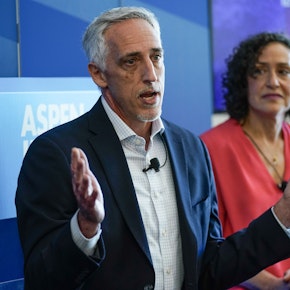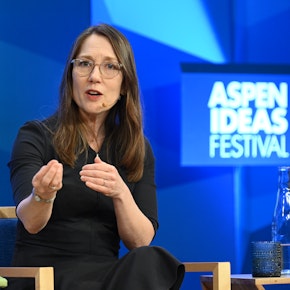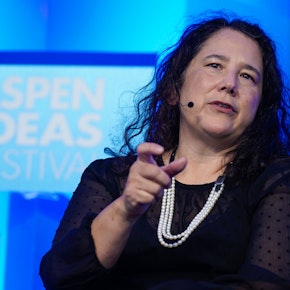Economy
Jobs

Join Jim Farley as he explores how drivers' needs and priorities are guiding the future of vehicle technology and reshaping our expectations of cars and trucks.


Poverty doesn’t care what color you are. Declining manufacturing jobs, income inequality and inadequate social safety nets affect all Americans. The problem of poverty demands a collective — and moral — response.

The U.S. is spending record amounts on infrastructure, with billions of federal dollars going to bridges, clean drinking water, broadband, and climate and energy. The governor of Maryland talks about what that looks like at state and local levels — and why it’s necessary now.

In this new Aspen Ideas format, all attendees gather each morning to kick off the day by exploring a current issue of deep complexity. For decades, American policy regarding those who reach our borders has been the subject of intense political disagreement, reflecting economic realities and cultural divides. What would a policy look like that meets both our labor and se...

Creating a meaningful life with work that’s fulfilling is not for the faint-hearted in a post-pandemic world. How can we navigate these choppy waters with grace, humor, and wisdom? (Book signing to follow.)

The impact of A.I. on the job market is debatable, as it has the potential to both automate tasks and displace workers but also the potential to create new economic opportunities and enhance productivity. How do workers, employers, and educators need to prepare for this brave new world?

Businesses of all sizes are struggling with skills gaps that threaten their growth, while millions of Americans are locked out of jobs by a paper ceiling. How do we build a skilled, fair workforce that meets the needs of employers and helps people reach their economic potential?

As employees everywhere are redefining their relationship to the office, what are we learning about what fosters productivity, growth, and meaning at work? In the battle between burnout and balance, how can employers build flexible workplaces that attract and retain talent while also maintaining organizational culture and connection?

Allowing everyone a fair chance at economic prosperity and upward mobility is a goal we can all support. But, how? Leaders of investment disruptor Robinhood, the MacArthur Foundation, and Prudential join to discuss the systems, practices, and policies to provide greater access to capital markets.

The 21st-century U.S. economy has faced significant challenges, of which the ripple effects — job loss, decreased access to credit, delayed investments, financial instability — have led to hardship for Americans and businesses alike. As the market ebbs in the wake of overlapping crises, how can a modern American Industrial strategy transform key economic sectors, strength...

As U.S. cities adjust to a new post-pandemic normal — characterized by empty office buildings and decreased foot traffic — how are city and federal leaders working with small businesses to reimagine downtowns?

A healthcare worker shortage is today’s reality, putting safe, quality healthcare at risk for everyone. According to the US Surgeon General's Advisory on Building a Thriving Health Workforce, the realities are that many of our health workplaces and practices are exhausting and demoralizing for our talented, caring, and overworked healthcare professionals. The emotional, ph...

David Rubenstein, co-founder and co-chairman of The Carlyle Group, one of the world’s largest private investment firms, discusses his perspectives on the investing world, and the insights recently gained from interviewing a number of the country’s best investors for his new book How To Invest—Masters of the Craft.

Two-thirds of American workers do not have a four-year college degree. In an increasingly tech-driven economy, how can we ensure that a lack of higher education isn’t a roadblock for this huge part of the population and, likewise, that talent shortages aren’t barriers to business and economic growth? What are the most innovative ways to upskill, reskill, or next-skill work...

How do we know the real effect of inflation on the buying power of individuals in the United States? Unless we change the way we analyze data and evaluate key economic indicators, we will not have an accurate picture of the health of our economy, according to Eugene Ludwig, a leader in finance and former comptroller of the currency. Ludwig is joined by two panelists on opp...

From advocacy and social impact to growing a global footprint, these women have redefined what it means to create a mission-driven company. Whitney Wolfe Herd, founder and CEO of Bumble, and Jessica Alba, founder and chief creative officer of The Honest Company, paved their own paths from start-up to success by staying true to their founding principles — and not listening...

American jobs and American democracy are both in crisis. Working people show up in political discourse in discussions of “the white working class” or “essential workers,” but our politics does little to improve their lot. Why has policymaking become divorced from the interests of working people, and what does this mean for our democracy? How does the nature of work influen...

In the third year of a global pandemic, many American workers have a new relationship with their work. Whether they are navigating new working models, striving for better work-life balance, or feeling anxious about their financial resiliency amid rising inflation and economic uncertainty — work looks and feels different than it did in 2020. Employers, meanwhile, face a num...

While the United States has the world’s deepest and most liquid capital markets, and the largest number of billionaires in the world, we also have historic levels of wealth inequality and racial disparity. The very real risk: These disparities might not only undermine our economy but our democracy. What will it take to narrow the gap and build wealth equity in America? Wha...

